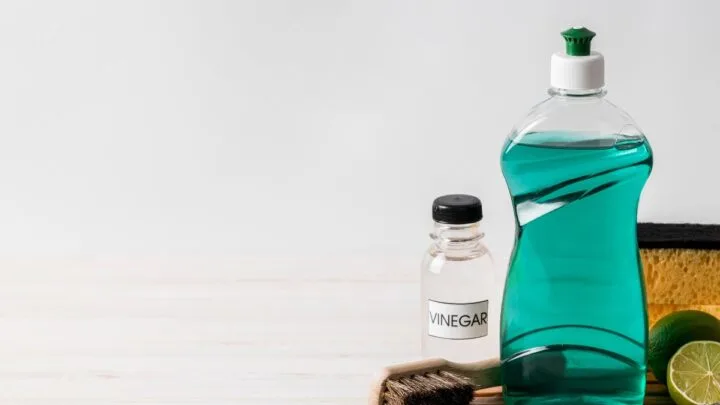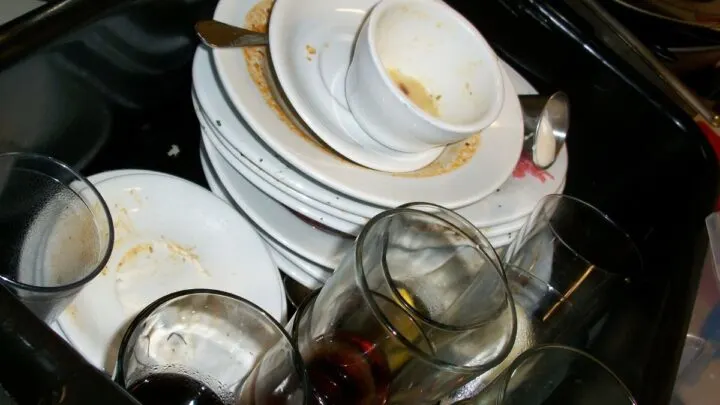Were you also under the impression that your dishwasher will work fine with a bit of dish soap?
If yes, then it’s high time for you to burst this not-so-soapy bubble.
Since your dishwasher is only looked at when you want to do the dishes, there’s a high chance of you running out of dishwashing supplies right when you need them the most.
Although dish soap might come off as a quick fix at the moment, you cannot really substitute it for a dishwasher detergent. They serve as a great solution when you’re manually washing your dishes but unfortunately, using them in your dishwasher can be quite catastrophic.
Dishwashing detergent, on the other hand, is specifically manufactured to be handled by a machine, hence has controlled soap content.
If you go on to substituting the recommended detergent repeatedly, not only would you be at the risk of clogging your plumbing, but will also end up with a ruined machine.
There’s a fair chance that you’ve been using dish soap in your machine every time your detergent supply finishes.
Here’s what you need to know to completely quit the habit:

Why Can’t You Use Dish Soap In The Dishwasher?
A dishwasher, however handy it may be, is a machine at the end of the day.
Its contact with water and other liquids needs to be properly designed to ensure better performance and prolonged durability.
You wouldn’t want to invest in a dishwasher if it starts to rust within a couple of months.
This is why the detergent meant to be used in a dishwasher is made to be gentle and milder than dish soap.
It contains enzymes that help in breaking down the particles, which are then drained away with the help of water.
You may be thinking that since it’s a detergent, it produces a lot of foam and gives your dishes a soapy bath.
However, that’s not the case, because a dishwashing detergent relies more on the repeated splashing of water.
When you’re doing the dishes by hand, you need more slip and foam.
This is exactly why dish soaps are manufactured to produce thick foams so that getting rid of the dirt particles doesn’t require too much force.
If you put the same amount of dish soap in a machine, be prepared for it to be boiling with bubbles and foam. The dishwasher will eventually stop working and the excess might cause a major spillage.
This can not only be dangerous for your machine but also for your walls, flooring, and plumbing.
There’s a high chance that your dishwasher is still plugged in right when all hell breaks loose- soap, water, and electricity: a perfect disaster recipe.
Cleaning up the mess is also a whole other story that can even take days to completely get rid of.
What To Do In Case You Put Dish Soap In The Dishwasher
Because of the common misconception, there are reports every day about people overflowing their kitchens and having no idea of tackling the situation.
If you find yourself in a scenario like this any time in your life, the first thing that you should tell yourself is to not panic.
This might be a bit difficult because seeing your dishwasher bubbling up might come off as a shock, and you probably won’t even be able to figure out its cause.
You don’t have to worry though, because these actions will help you get hold of the situation real quick:
Turn The Machine Off
Before it gets worse, make sure you remember to put your current cycle on hold.
If you notice the spillover early and are sure that it hasn’t reached the electric connections, you can also unplug the dishwasher for maximum safety.
Before working towards cleaning up the mess or walking around to study the situation, it’s best that you get the electricity hazard out of the way.
Turning it off will not only help in reducing more foam from forming, but will also prevent any technical damage to your machine.
Get To Work
After making sure that further production of foam and studs is stopped, it’s your time for grabbing your cleaning essentials.
Get rid of as much water as you can and thoroughly mop your surfaces.
If you’re too late to notice your overflowing dishwasher, you might even come to see your cabinets drenched in water.
Make sure you wipe every inch with a cloth so that the wood and flooring can dry up quickly. If you have a fan in that area, let it be on until you can’t feel the dampness.

Deal With The Dishes
Start removing all the dishes that were already in the dishwasher. If your washing cycle has just started, you may want to give them a quick rinse so that the soap residue doesn’t stick to them.
In case of major spillovers, there’s a high chance that your machine will require some repairing or just a quick look from a mechanic.
This might be a big inconvenience at first but it is best that you leave your dishwasher alone for a few days, for it to start functioning properly.
Drain All The Water From The Dishwasher
Set your dishwasher to its drainage mode and once most of it is drained, you’ll have to manually get rid of all the remaining water.
You can also add in more water or use a wet cloth to get all the soapy residues.
Check For Remaining Soap
Let your dishwasher rinse itself with water for a few minutes. Once the water is running clear with no traces of foam or bubbles, you can now be positive that there’s no leftover dish soap.
Check if your dishwasher is working fine and you’d be all set for washing your dishes again!
Final Word on Putting Dish Soap in the Dishwasher
Mistakes happen, but even just one soap mistake with your dishwasher can be quite disastrous. However, you can now be prepared for any such mishaps because of this guide.
All it takes to avoid or deal with a mess is a bit of attentiveness and of course, a few tips up your sleeve!


